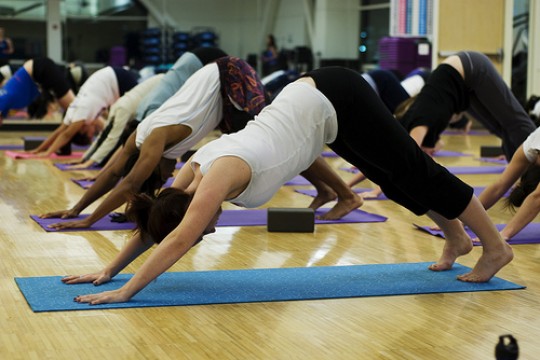Study suggests yoga may help caregivers of dementia patients manage stress
Study suggests yoga may help caregivers of dementia patients manage stress

Using yoga to engage in brief, simple daily meditation could lead to improved cognitive functioning and lower levels of depression for caregivers of patients with dementia, according to findings published this week in the International Journal of Geriatric Psychiatry.
In the study (subscription required), UC Los Angeles researchers randomly assigned 49 family caregivers who were taking care of their relatives with dementia into two groups. One group participated in a daily 12-minute yoga and meditation practice for eight weeks.
The remaining volunteers were asked to relax in a quiet place for 12 minutes daily with their eyes closed while listening to a relaxation CD for eight weeks. Participants ranged in age from 45 to 91 years old and included 36 adult children and 13 spouses. According to the UCLA release:
At the end of the eight weeks the researchers found that the meditation group showed significantly lower levels of depressive symptoms and greater improvement in mental health and cognitive functioning, compared with the relaxation group. In the meditation group, 65 percent showed a 50 percent improvement on a depression rating scale, and 52 percent of the group showed a 50 percent improvement on a mental health score. This compared to a 31 percent depression improvement and a 19 percent mental health improvement for the relaxation group.
The researchers also found that meditation increased telomerase activity and thus slowed cellular aging. Telomerase is an enzyme that maintains the DNA at the ends of our chromosomes, known as telomeres. Telomeres are associated with a host of health risks and diseases, which may be regulated in part by psychological stress. In the absence of telomerase activity, every time our cells divide, our telomeres get shorter and shorter, until eventually, they become so short the cells die. If high telomerase can be maintained or promoted, though, it will likely promote improvement in telomere maintenance and immune cell longevity.
By Lia Steakley
Stanford University Medical Center
Photo by crmgucd
###
* Stanford University Medical Center integrates research, medical education and patient care at its three institutions – Stanford University School of Medicine, Stanford Hospital & Clinics and Lucile Packard Children’s Hospital.
** The above story is adapted from materials provided by Stanford University School of Medicine
________________________________________________________________




















